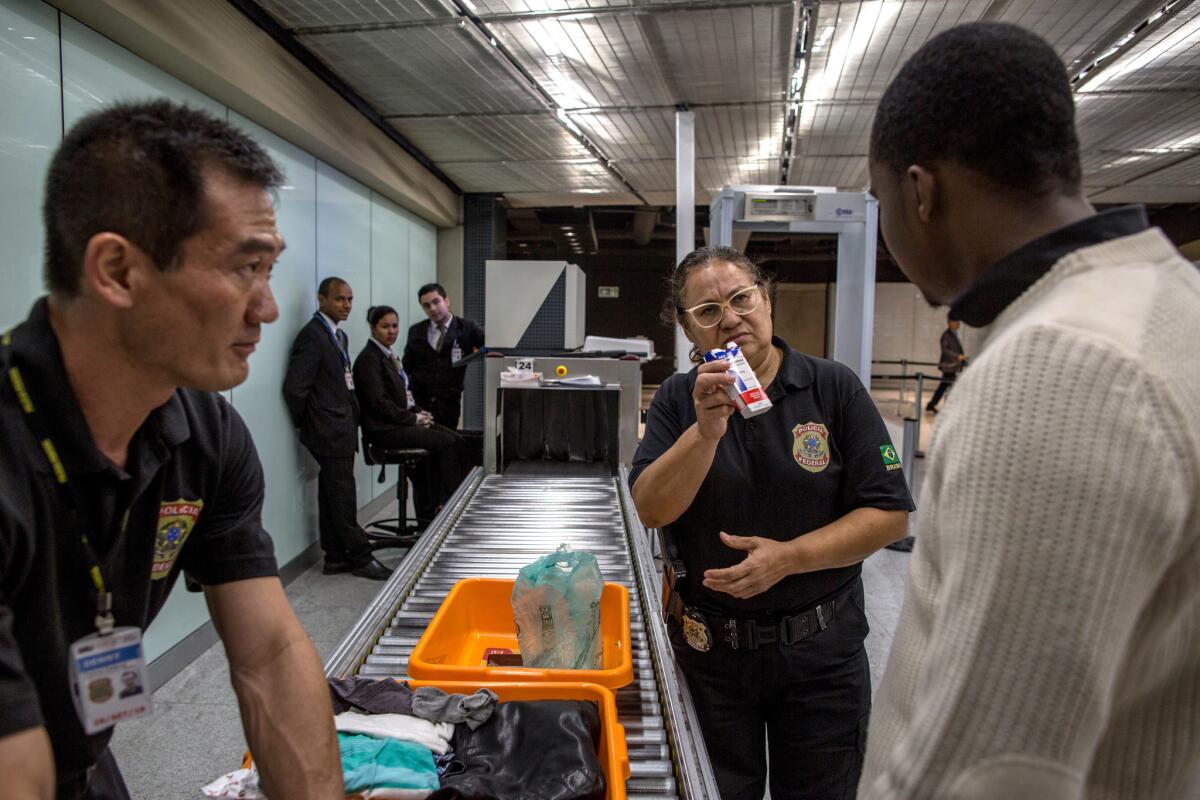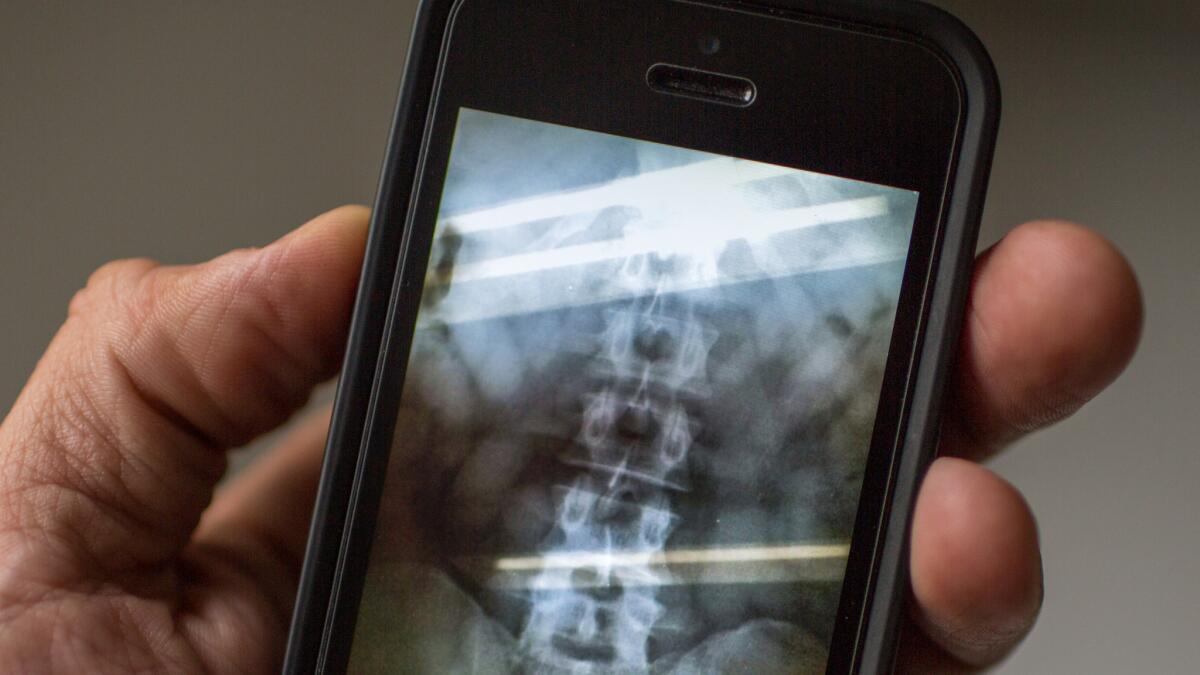At the busiest airport in South America, a cat-and-mouse game to catch cocaine smugglers

The gray carry-on glides along the conveyor belt toward the X-ray machine.
It’s almost midnight at Guarulhos International Airport, just outside Sao Paulo, and the suitcase and its owner, a bald Nigerian man in jeans and a T-shirt, are first in line at Terminal 2 security for the 2:30 a.m. flight to Addis Ababa, Ethiopia.
The X-ray machine operator peers at the images on her screens, then asks federal agent Elza Lucia de Melo to take a look and decide if the bag should be searched. Melo gives a curt nod.
Hard-shell suitcases like this one have become a staple for drug traffickers, who slip a second shell inside to create a thin hiding spot for their illegal cargo. The flight to Ethiopia, a transit point for cocaine destined for markets in southern Africa, is a favorite too.
At Guarulhos — the busiest airport in South America, with 6.5 million people passing through its corridors every month — federal agents confiscated more than 1.34 metric tons of cocaine in the first 11 months of 2017. Seizures for the year were expected to top the previous total of 1.41 metric tons.
Brazil has become one of the most important shipping points for cocaine in the world. While the main trafficking routes to the United States — the biggest consumer of cocaine — go through Central America and Mexico, the United Nations Office on Drugs and Crime in 2017 identified Brazil as the most frequent point of departure for shipments bound for Europe and Africa between 2010 and 2015, the most recent period measured.
The reason is probably geography: Brazil borders the world’s top three producers of cocaine — Colombia, Peru and Bolivia — and the airport at Sao Paulo offers direct flights to four continents.
Brazil has become South America’s biggest destination market for cocaine in recent years, the U.N. reported, but exports can be even more lucrative. The street value of cocaine rises dramatically the farther it moves from its source — a gram is $12 in South America, $60 in parts of Europe and up to $300 in Australia.
The airport isn’t Brazil’s only transit hub: In January 2017, Djibouti authorities reported the seizure of half a ton of cocaine from a container ship en route from Brazil to Spain.
It was disguised as flour.
The man with the gray suitcase fidgets with an envelope as he approaches the metal detector. In her 32 years as a federal agent, Melo has learned to notice such things.
When she asks to see his passport and ticket, he pulls them out of the envelope and hands them over. Melo recognizes his name. It was on a list of targets she memorized.
“How long will you be staying in Addis Ababa?”
“Until March,” he says. That’s three months.
“You already speak Portuguese well,” Melo says. “You must be living here for some time now.”
She drops her eyes to the passport, then raises them back up to his face. He’s been in Brazil since 2008, he says, shifting from one foot to the other.
As an airport employee goes through the clothing in the suitcase, Melo walks around the conveyor belt to talk to a bearded agent on her team named Momm.
“Those sandals,” she says. “They’re the same kind that had cocaine in them that other time, remember?”
Momm — who like most of the security workers agreed to a reporter’s presence one weekend last month only if his full name was not published — nods slowly.
“We need to swab the suitcase,” he says.
With gloved hands, the employee who emptied the bag passes a wand over the suitcase and inserts it into a small blue machine that detects traces of explosives and narcotics. The readout appears in a few seconds: 14% cocaine.
That’s not enough to take action. Drug shipments register at least 50%. Anything less could mean the man used cocaine and left traces when he picked up his suitcase. Another bag touching his could also lead to the low-level reading.
The team swabs it again, this time on the inside lining. It comes back 8%.
Momm calls the desk at Ethiopian Airlines to ask somebody to bring over the man’s two checked items. Nobody answers. At this time, especially on a Saturday night, airlines have a limited number of staff working.
He calls again, the phone resting between his left shoulder and ear.
“They’re already in X-ray downstairs,” he reports to Melo. “They’ll bring them up.”
Melo tells the man to wait in one of two chairs along a wall of windows.
As others start making their way through the security line, Momm hands Melo a small slip of paper with the name of another Nigerian — Emmanuel — who is expected to check in for the Addis Ababa flight. A few days earlier, he missed a $1,800 flight, then a $430 flight, before pleading with an attendant to get him on the next one available. A $2,000 seat in first class today was his only option. He took it.
If he makes it to check-in, the airline attendants will let the agents know.
Shortly after 1 a.m., the first Nigerian passenger’s luggage is brought up: a large black suitcase and a cardboard box, both wrapped tightly in plastic. In an X-ray, the box appears to contain electronics, and the suitcase is full of shoes.

An agent named Dennis uses a box cutter to remove the plastic from the suitcase. He opens it and starts pulling out the contents.
Melo picks up a pair of white sneakers.
“Are these all new?” she asks the man.
He nods.
She picks up a woman’s boot and smells the heel.
The phone rings.
“He’s here,” Momm calls over to Melo, already putting the receiver down.
“Go,” she says.
Momm and Dennis run to the Ethiopian Airlines check-in area. The man they’ve been waiting for, Emmanuel, is there, a hard-shell carry-on suitcase at his feet and a green plastic bag in his hand.
“What do you have there?” Dennis asks.
Emmanuel hands over the bag, which contains two medication boxes that are well known to the agents looking for drug mules who swallow narcotic-filled capsules or balloons. The box of loperamide, an anti-diarrhea drug, is empty. The box of bisacodyl, a laxative, is full.
Melo arrives.
“He was clean,” she says of the first passenger, who is allowed to board the flight to Ethiopia but will remain on a watch list.
When Dennis asks for Emmanuel’s tickets, he passes them over. His hands are shaking.
The team takes him back to the security area.
The agents pull everything out of the small suitcase that is his sole piece of luggage: a cellphone, wooden prayer beads, an empty duffel bag, clothing, shoes.
“What do you do for work here, Emmanuel?” Melo asks.
“I sell clothes on 25 de Marco Street,” he says.
“How much do you make doing that?”
“Around $75 a day.”
He says he’s going on to Nigeria after Ethiopia. Melo asks if he has any drugs with him.
“There are no drugs here,” he says.
The medication, he says, is for a sore stomach.
Melo calls the federal police station in Terminal 3 to explain the situation. She needs paperwork drawn up to be able to take Emmanuel to a nearby hospital for an X-ray, the only way to know for sure whether he has capsules of cocaine in his stomach.
After a full body search behind closed doors, Melo and Dennis take Emmanuel down a series of long, winding corridors to the station. There, he gives an agent his basic information. He entered the country in 2014 seeking refugee status, he says, and has a wife, daughter and legal residency here. The story checks out.
He continues to deny that he’s carrying drugs. If he is lying — and a capsule bursts — he could die in seconds.
The agents take him to a door at the back of the station that leads to a parking lot where a black SUV is waiting.
“We won’t be back tonight,” Melo tells another agent before turning on the siren.
“With all the medication he took, this could take days,” she says.
Hours later, Emmanuel’s X-ray shows he swallowed upward of 100 capsules, all positive for cocaine. By Monday morning, 90 were expelled. Pairs of agents would wait in shifts with him for the rest.
Langlois is a special correspondent.
Sign up for Essential California
The most important California stories and recommendations in your inbox every morning.
You may occasionally receive promotional content from the Los Angeles Times.







